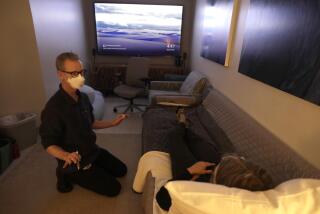HEALTH CARE
- Share via
Drug Testing: A viable treatment for the debilitating effects of stroke and head trauma is a step closer to becoming reality.
Acea Pharmaceuticals Inc., an Irvine-based drug development firm, recently announced that it has put together a pair of advisory groups to help the company prepare for testing on patients a compound designed to help people recover from head injuries.
Selection of the panels--one to study the effectiveness of the company’s Acea 1021 compound on head trauma victims and the other to study its effectiveness on stroke victims--is a necessary step before the company can begin testing on humans and preparing an application to the U.S. Food and Drug Administration.
The panels are made up of experts in the field who will guide the company’s scientific research as it develops the new product.
The five-member head trauma panel consists of scientists, researchers and physicians from the Medical College of Virginia, Duke University, UC San Francisco and the University of Kentucky.
The eight-member stroke panel includes representatives from Stanford University, Cornell University, the New England Medical Center, Oregon Health Sciences University, UC San Diego, the University of Cincinnati and the University of Texas.
We’re “pleased to have clinical investigators from the nation’s leading neurological treatment centers,” said Acea Chairman Robert G. McNeil. “Their expertise and leadership will prove invaluable.”
If all goes well, Acea will soon become part of CoCensys Inc., another medical development company in Irvine, which is trying to develop a treatment for epilepsy and high anxiety.
CoCensys last year signed an option to purchase privately held Acea for 4 million shares of CoCensys stock, valued at $20 million. That option must be exercised by June, said Joseph Fojtasek, chief financial officer for CoCensys.
CoCensys, which is in the midst of human clinical trials for its own product, wanted a year to watch the development of Acea’s compound before committing itself to the acquisition.
The panel selection appears to be a good sign.
“They appear to be complementary to us,” Fojtasek said of Acea. “Their panels add a lot of credibility to the program.”
More to Read
Inside the business of entertainment
The Wide Shot brings you news, analysis and insights on everything from streaming wars to production — and what it all means for the future.
You may occasionally receive promotional content from the Los Angeles Times.










